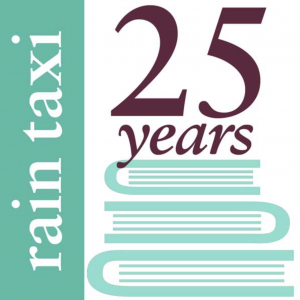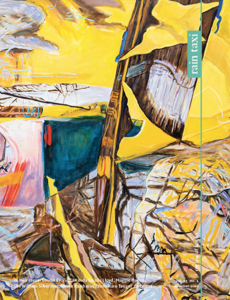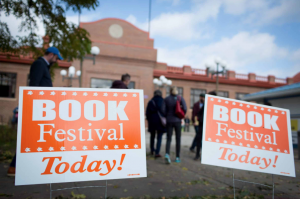We spoke with Eric Lorberer, the editor of Rain Taxi, in this installment of the CLMP Member Spotlight series.
What is the history behind Rain Taxi? When was it founded and what was the original mission?
 Rain Taxi published its first quarterly print issue in January 1996, and it was sort of a hybrid between a funky zine and an academic journal; the mission was to shine a light on independent publishing (then almost always called “small press publishing”) and the authors, artists, and publishers who create it. We gambled there’d be enough people like us, former grad students and bookstore employees, who dug the kind of writing that tends to be out of the limelight—and happily, we were right, as we grew from a 1,000-copy print run to the 15,000 copies we circulate today. Many readers find free issues of our print journal in over 150 locations nationwide—mostly independent bookstores—and it is also shipped by mail to our members. (Yes, that was an unabashed plug to join us!) Of course, once the Internet took off, we began issuing an accompanying online edition each quarter, though it has completely different material. Together, the two publications offer readers a broad look at the noteworthy literary art being published today.
Rain Taxi published its first quarterly print issue in January 1996, and it was sort of a hybrid between a funky zine and an academic journal; the mission was to shine a light on independent publishing (then almost always called “small press publishing”) and the authors, artists, and publishers who create it. We gambled there’d be enough people like us, former grad students and bookstore employees, who dug the kind of writing that tends to be out of the limelight—and happily, we were right, as we grew from a 1,000-copy print run to the 15,000 copies we circulate today. Many readers find free issues of our print journal in over 150 locations nationwide—mostly independent bookstores—and it is also shipped by mail to our members. (Yes, that was an unabashed plug to join us!) Of course, once the Internet took off, we began issuing an accompanying online edition each quarter, though it has completely different material. Together, the two publications offer readers a broad look at the noteworthy literary art being published today.
And I guess any question about our history deserves a little shout-out about our name: for those who don’t know, it’s an homage to the Salvador Dalí sculpture that is called (in English) Rainy Taxi—we clipped it to Rain Taxi as a nod to the great Tom Waits album Rain Dogs. A cross between Dalí and Waits seemed like the right vibe for the beat we wanted to cover.
What inspired you to publish a print edition alongside an accompanying online edition, rather than a single edition in two formats? How exactly does the content differ between the two?
 First, we strongly and specifically believe in the importance of print as a medium. Holding a magazine (or a book or a letter) in your hands is a different experience than reading one online, and we want to create something that will exist in the physical world, that will sit on people’s nightstands and be handed off to friends. At the same time, we realized early on that the internet wasn’t a fad, and we embraced it as a way for our coverage and our services to be accessible to a global audience. Having different content between the two reading technologies is our attempt to honor them as separate mediums. The type of content is not that different, and we don’t think of either as a “better” platform—though we often publish something online that simply doesn’t fit well into a print layout. So in that sense it’s also a safety valve, allowing us to publish as much material as we can muster.
First, we strongly and specifically believe in the importance of print as a medium. Holding a magazine (or a book or a letter) in your hands is a different experience than reading one online, and we want to create something that will exist in the physical world, that will sit on people’s nightstands and be handed off to friends. At the same time, we realized early on that the internet wasn’t a fad, and we embraced it as a way for our coverage and our services to be accessible to a global audience. Having different content between the two reading technologies is our attempt to honor them as separate mediums. The type of content is not that different, and we don’t think of either as a “better” platform—though we often publish something online that simply doesn’t fit well into a print layout. So in that sense it’s also a safety valve, allowing us to publish as much material as we can muster.
Can you tell us a little about your editorial process? With your focus on reviews, is this process different from that of a more traditional literary magazine?
Perhaps it’s another hybrid. We’re a bit like a newspaper in that we assign books, establish word counts, vet for conflict of interest, etc. But, since we view criticism as an art form and we want to encourage its practitioners, we also behave like a literary magazine in that we accept submissions and edit toward a great final piece of writing rather than worry about the pressures of column inches and hard deadlines. The two-fold strategy is time-consuming, but it has been a success in creating a space for a wide swath of people to get involved; while we have a loyal coterie of regular reviewers, we also happily add new voices constantly. Assuming submissions meet our posted ethical guidelines, we make an active effort to consider and work with them; we want to feature and nurture emerging critical voices alongside long-respected ones. But we edit very seriously—I’m from the school of thought that every detail matters—and we proofread diligently too. This has made us a bit of a slowpoke in the age of instant gratification, but the tradeoff is worth it to me, and I find it is to most writers too. It became obvious to me early on that really good writers actually want to be edited; when we published a review written by David Foster Wallace, he and I went back and forth for pages about a comma in his piece! The editor-geek in me admits that that correspondence brought me an even greater joy than being able to include his byline in Rain Taxi.
What role do you see Rain Taxi playing in the wider field of literary criticism?
Can I invoke the hybrid idea again? Most criticism falls into relatively specialized academic or journalist camps, and we wanted to create something that borrowed the best of both worlds, but that sought to reach the so-called “general” reader—and to bring them the joy of discovery, since publishing is a tsunami even for the most avid reader. There are people who might love fiction, but they are also interested in comics; they might specialize in poetry, but they are actively interested in politics; they adore biographies of writers, but are curious about photographers and filmmakers too. And even within a genre, we want to confront territorial impulses; we once placed a review of Artaud next to a review of Billy Collins, to the consternation of both fan bases. But the world is big enough for both.
Another way we think about this question is to seek opportunities to get critical writing where it can be of real use; this takes shape in both the titles we choose to feature and our distribution strategy. Although we cover some titles from major publishers and established authors, we are more interested in covering books from under-appreciated voices and small, independent presses. We also specifically make sure our print and online editions—and most of our events, including our annual, bombastic Twin Cities Book Festival—are available free of charge because we don’t believe critical thinking belongs exclusively to those with disposable income. We are advocates of the gift economy, and of literature not as a commodity but as an art form that has social impact.
Along with the Twin Cities Book Festival, you also organize the Rain Taxi Reading Series. How have these events been impacted by current events?
 Quite a bit. We had a lot of exciting plans, actually, because this year is the 25th anniversary of Rain Taxi and 20th of the Twin Cities Book Festival, and we really wanted to go all-out and celebrate in style with various cool events—of course we’re still planning on doing that, but it’s going to look quite different. In spring we especially slowed our roll; we didn’t exactly hop right onto Instagram Live or TikTok or anything when we realized in-person gatherings wouldn’t be possible for a while—because we’ve always taken time to respond to environmental changes, which in turn is because we want our response to be of the greatest use to our community.
Quite a bit. We had a lot of exciting plans, actually, because this year is the 25th anniversary of Rain Taxi and 20th of the Twin Cities Book Festival, and we really wanted to go all-out and celebrate in style with various cool events—of course we’re still planning on doing that, but it’s going to look quite different. In spring we especially slowed our roll; we didn’t exactly hop right onto Instagram Live or TikTok or anything when we realized in-person gatherings wouldn’t be possible for a while—because we’ve always taken time to respond to environmental changes, which in turn is because we want our response to be of the greatest use to our community.
We had our first digital event last month, a sort of variety show that was an extension of our summer print issue, and it went really well and was a lot of fun. (We’ll be doing another for issue 99—stay tuned!) And we’re looking forward to our 20th Annual TCBF, which will be digital this year as well and—rather than our regular one-day affair—spread over three days this year, from October 15 to 17. We’re building a cool new website to replicate as best as possible both the variety of author events we typically host, and the excitement of our bustling book fair. An event we’re particularly excited about is the launch reading for our new chapbook (have I said yet that we also publish chapbooks?), an anthology of new work by Black poets in the Twin Cities.
It’s been a challenge to reinvent the wheel of our events platform, but it’s also bringing unexpected perks—the biggest being that without being tethered to a single geographic location, these events will now be available to our nationwide and worldwide community of readers.
How has Rain Taxi changed in the past quarter century? What are some of your hopes and goals for the next few years?
Well, we started out as a magazine, but pretty quickly realized that our mission demanded more—which is why we began doing live events, publishing chapbooks, creating service elements like our Twin Cities Literary Calendar and promotions for Independent Bookstore Day, and being engaged in numerous partnerships and civic strategies (serving on panels, being involved with city and community reading initiatives, speaking at colleges, etc.). I guess we felt the point wasn’t merely to review books of merit, it was to advocate for the merit of books. Hopes and goals feel strange to think about at the pandemic-pressured moment, but we feel more committed than ever to using our platform to amplify the work of marginalized writers and critics. It all revolves around continuing to find ways, no matter what happens in the big bad world, to unite books with their readers. Powerful magic is there.
